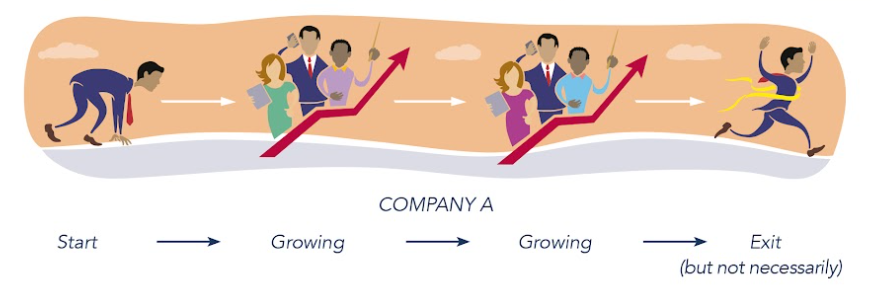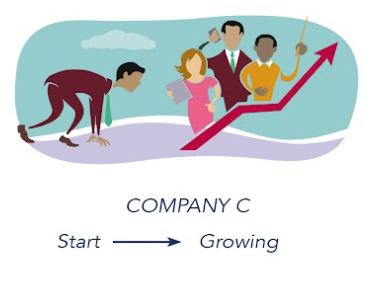

Drive is the internal force that pushes you forward to changing your life and determine your own future. Entrepreneurs must feel ambitious and driven inside to overcome whatever challenges are thrown at them and to come out on top in the end. You will read the story of my childhood and youth in China and why I became driven to leave my native country to come to the US to study and change my life.

This is a talent that derives from being watchful and perceptive about events in the world that could represent opportunities for your current company, a future business on your road to becoming an entrepreneur, or additional companies you can build as you move towards being a parallel entrepreneur.


Risk-taking is endemic to entrepreneurship, but I have learned that the smartest way to think about taking risks must be based on long-term results. Chasing short-term payoffs may appear to be attractive, but my experience shows that the risk of failure behind any short-term opportunity could be far higher than you imagine, and certainly much higher then a long-term one of the same nature.

While having the ability to capitalize on opportunities requires strategic thinking, I am referring in this chapter to two additional types of strategic thinking that I believe are necessary for entrepreneurs. The first relates to learning how to leverage. The second focuses on the ability to innovate, coming up with new ideas to improve your own business systems, processes, and methods of achieving your goals. In fact, leveraging and innovating go hand in hand, as you will learn in this chapter.


Most people are not born leaders, yet being an entrepreneur requires you to develop this talent. In this chapter, I share five Leadership Advice lessons that I believe are pivotal to successfully managing any young company. One of these focuses on how to be a visionary, by which I mean someone who can recognize far in advance, and before others, potential new trends that could become the next profitable business opportunity. You will also learn why being a parallel entrepreneur actually improves your visionary skills because you can peruse a wider horizon of trends when you operate multiple companies.

Chasing success in business takes a toll on your soul. This chapter is about the most personal matters of your life: your marriage or relationship, your family, your mental and physical health, managing your time, and never forgetting what counts most in life. I discuss how to balance work and home life when you work with your spouse, and you will read an interview with my wife, Stella Zhang, COO of ALC.
The goal of the parallel entrepreneur is to take advantage of potential synergies, of which
there are many, among all their businesses.
One can read dozens of books about how to succeed as an entrepreneur, so why should you read this one? My answer is that I believe what I have to share is unique and differs significantly from what other books or courses will offer you, in three ways.





The third unique element of this book arises from the fact that I am a first-generation immigrant entrepreneur in America. I was born and grew up in Beijing and spent my youth knowing almost nothing about America. I spoke only broken English when I arrived in the US to attend the Duke University PhD program in sociology, which after the first year I changed to the master’s program in statistics. I never imagined that I would start a business, much less many of them, when I completed my MS degree at Duke.
The immigration system in the US is stacked against highly motivated immigrants with exceptional drive and intellect… I wonder how much talent the US misses out on through a bureaucratic immigration system that needs to be fixed.

First-generation Entrepreneurs: Special Issues Regarding Drive
They may have had very little opportunity for a good education. Their government may not believe in capitalism and thus not allow anyone to dream of running their own business. They may have come from poor families with no resources to even start a business. For such immigrants, coming to the US is the first time in their lives that they can actually release their ambitions. They have no limiting beliefs to hold them back anymore.

If you are not a first-generation immigrant, it may be difficult for you to comprehend the strength of drive that immigrants to the United States have. We are unlike other Americans who, being born in the US, assume that they have the freedom to do whatever they want in life. Many natural-born Americans have the ambition to start their own business, but I believe their drive is different than that of first-generation immigrants. Immigrants to America often come from countries that have no freedom.
They may have had very little opportunity for a good education. Their government may not believe in capitalism and thus not allow anyone to dream of running their own business. They may have come from poor families with no resources to even start a business. For such immigrants, coming to the US is the first time in their lives that they can actually release their ambitions. They have no limiting beliefs to hold them back anymore.

In my case, I had to find an employer who was willing to vouch for me so I could stay in the country for up to the six years that it could take to go through the green card process. This stressful process is why many immigrants come away from their green card experience with a strong drive to succeed, given all they have been through to remain in the States. They are so appreciative of the opportunity to be here and to have the freedoms afforded to American citizens.
The point is, for many immigrants, it is almost impossible to plan their future when they have no idea if they even have a future in the US.
When it comes down to career development, what often happens is that this difficult immigration process puts a damper on the entrepreneurial dreams that many immigrants have — until the moment they finally receive their green card. And when they can finally breathe fresh air, nothing can possibly stop them any longer.
“Why miracles happen to some but not others, I cannot explain. I was one of the fortunate. I had been mired in the proverbial swamp of failure when a
lifeline was thrown my way.”

It is often thought entrepreneurs are born with natural drive; this makes them different, more talented than other people. I disagree. I believe anyone can develop the strong degree of drive it takes to be an entrepreneur. Your drive may not be there at birth, but all it takes is a spark to light it. Like a cold engine that ignites from a spark plug, there often comes an event or a person in someone’s life that suddenly inspires that individual to find the drive of an entrepreneurial go-getter.
If you want to be an entrepreneur, you cannot just be a tire-kicker. You have to buy the car and drive it.
Many investors fail to understand this accounting priority. They are oriented towards seeing the business produce profits for them, but this is a serious misdirection. Even if you don’t have investors, you alone may be focusing too much of your effort trying to produce profits rather than revenues, believing that accumulating profits will attract new investors (as well as making you rich). The problem with this thinking is that you may get a little bit of profit initially, but if the business loses opportunities to generate a lot of revenue, it is more likely to go under and your fountain of profits will eventually dry up.

There is a difference in how you operate a business when your goal is to create revenue rather than profit. Let’s say it takes 30 minutes to sell your product or service to a customer and the sale brings in $300 in revenue, and $75 in profit. On average, say you can make 14 sales a day, thus $4,200 per day in revenue, and $1,050 in profit.
Compare that to a scenario in which you want to increase profits, so you raise the price to $900, which allows you to make $400 in profit. But, with this higher price, it takes you longer to make each sale. Say it now takes you two hours to sell the same product to a client (you have to meet them, spend time chatting, persuade them to buy, etc.), rather than 30 minutes; now you can make only four sales per day, bringing in just $3,600 in revenue, but $1,600 in profit.

As this example illustrates, when your eye is on maximizing profit, not revenue, you are losing $600 per day in revenue, despite making an extra $550/day in profit. Over 20 business days per month, you are losing $600/day, thus $12,000/month.
Over several months, the loss of tens of thousands in revenue may be sufficient to force you into bankruptcy, given that you do not have enough cash to pay expenses. Yes, someone made a nice profit in that time frame, but it was short-lived.

From its gripping start to its motivating finish, Crossing the Swamp is a must-read for entrepreneurs at any stage. John Shen shares his 20 years of business experience to help us overcome the challenges that business (and life) will surely throw our way! Whether you are a veteran or a novice, you will find the tools you need and the inspiration to use them. — Michael Houlihan and Bonnie Harvey, Founders of Barefoot Wines, and New York Times Bestselling Authors of The Barefoot Spirit

In Crossing the Swamp, John Shen shares the story of his own successful parallel ventures while presenting a roadmap of eight key elements which are vital for any parallel entrepreneur to adopt to avoid pitfalls and achieve success. John outlines these points while sharing the ups and downs of his personal journey with brutal honesty and clarity. This approach is why I believe Crossing the Swamp is not only critical for the parallel entrepreneur but greatly beneficial to any modern entrepreneur or student of business. — Bruce Thompson, California politician

I highly recommend Crossing the Swamp. It’s a must-read for any startup founder who seeks inspiration and valuable insights into entrepreneurial success. John Shen provides clear, actionable advice that proves he knows the inner life of an entrepreneur. Even more, no other book about entrepreneurship better captures the challenges of being an immigrant in the US who seeks the American Dream. If you want to ensure your startup is successful, this is the book to read. — Simon Pang, Co-founder, Royal Business Bank, 1st generation immigrant entrepreneur

What sets Crossing the Swamp apart from other business books are its clear strategies for adaptation and change, which come from real-life business lessons… Businesses, libraries, and entrepreneurs seeking concrete assessments of common obstacles and how to overcome them to cultivate a wider-ranging success than a singular approach must have Crossing the Swamp in their collections. – D. Donovan, Midwest Book Review, Senior Reviewer

A well-constructed memoir/business guide with a special focus on first-generation immigrants…Many business writings are framed as cutthroat; impressively, the opposite is true here, as the book focuses instead on the inspirational, often emphasizing aiding others who seek to become entrepreneurs and giving back to the community. — Kirkus Reviews

John Shen offers down-to-earth, practical, insightful, and comprehensive lessons learned along his fascinating twenty-year journey from a Chinese immigrant to a multiple national award-winning parallel entrepreneur of five companies in this must-read book for entrepreneurs…the lessons learned are not just based on John’s successful ventures but his failures and darkest hours, the insights from which are simply unparalleled. —Imran Currim, Executive Director, Beall Center for Innovation and Entrepreneurship, and Distinguished Professor of Marketing at the University of California Irvine Paul Merage School of Business

This book encompasses a multitude of valuable lessons in the realm of business..both a source of motivation and entrepreneurial awareness by presenting the life of a successful innovator and his journey to success…highly recommend this book to new startups in the business world (who) can benefit from adopting the author’s leadership culture. — Online Bookclub Review

John Shen’s book is not only a remarkable personal journey leading to understanding, wisdom, and ultimately enlightenment to become an outstanding entrepreneur and innovator, but it is much more. John’s strength is his intuitive understanding of empathy. — Ira Kurzban, Attorney At Law

The founder of five companies, Shen was born and raised in Beijing and spoke little English when he arrived in the U.S. to pursue a PhD in sociology at Duke. Now, he’s expansive about his success: I’m writing this book to share my entrepreneurial journey because I believe anyone can do what I have done. — Blue Ink Review

Distilling decades’ worth of business experiences into professional-growth advice for fellow entrepreneurs, Crossing the Swamp is inspiring. — Foreword Reviews